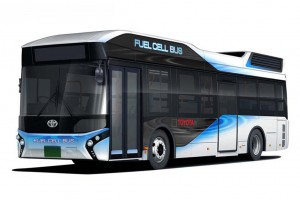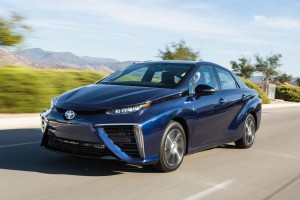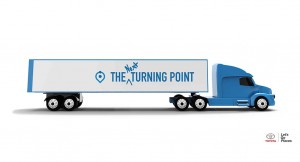With the little Mirai model, Toyota is now one of three automakers selling fuel-cell vehicles in the U.S. market. Now, the automaker is looking into potential heavier duty applications, including the possible of using hydrogen to fuel a fleet of zero-emissions trucks.
Such an approach could create a vast new market for hydrogen technology – and solve the problem that clean air proponents have had trying to figure out how to clean up truck emissions. Because of their size and weight, as well as range issues, current battery technology does not appear to be a good fit for large, long-haul trucks.
“Toyota has long maintained that hydrogen fuel cell technology could be a zero emission solution across a broad spectrum of vehicle types,” the Japanese maker said in a brief statement. “The scalability of this technology is enabling the automaker to explore a semi-trailer truck application for a California-based feasibility study.”
Fuel-cell vehicles rely on a system called a “stack” to combine pure hydrogen with oxygen from the air. That generates a flow of current that can be used to run the same motors found in a battery-electric vehicle.
(Toyota fuel cell buses ready for Tokyo testing. Click Here for the story.)

Toyota plans to introduce over 100 FC buses mainly in the Tokyo area, ahead of the Tokyo 2020 Olympic and Paralympic Games.
The concept was first conceived in the 1850s, through fuel-cell technology only found serious application more than a century later, providing electricity for the Apollo moon craft. Automakers have been tinkering with hydrogen power for decades, but the recent launch of the Toyota Mirai, Honda Clarity and Hyundai Tucson Fuel-Cell Vehicle has kicked off the first serious effort at commercialization.
Toyota last month said it will begin selling hydrogen buses and will work with the Tokyo Metropolitan Government to get a fleet of those vehicles into service ahead of the 2020 Olympics which will be held in the Japanese capital.
The latest announcement could take things a significant step further, Toyota saying it has formed a unit within its U.S. research and development facility to see if hydrogen power could be used on heavy-duty trucks.
Such a move could have significant advantages in terms of reducing air pollution across the U.S. According to the Union of Concerned Scientists, medium- and heavy-duty trucks produce about 20% of the greenhouse gases from the transportation sector. And though federal regulations have clamped down in recent years, trucks also produce a disproportionate amount of smog-causing oxides of nitrogen and particulates.
(Click Here for details about the Honda Clarity FCV’s fuel economy rating.)
There are technical challenges, however, that Toyota will have to address, including the scalability of fuel-cell technology. The good news is that electric motors produce large amounts of load-pulling torque.

The Toyota Mirai fuel-cell vehicle provided the blueprint for the fuel cells that will power buses in Tokyo starting next year.
Another issue equally impacts efforts to expand the use of hydrogen to power light-duty vehicles: the lack of a widespread refueling network. Right now, those three fuel-cell passenger cars are being sold only in select regions of California where hydrogen pumps are open to consumers, notably around Orange County, the San Francisco Bay area and the state capital of Sacramento.
Some proponents feel that a push to use hydrogen in trucking fleets could encourage energy suppliers to expand that grid to other parts of the country.
Toyota isn’t the only company studying potential heavy-duty applications for fuel-cell technology. A Utah-based start-up, Nikola Motors, plants to show off a Class 8 truck, dubbed Nikola One, on Dec. 1, in Salt Lake City.
(What! You didn’t celebrate Hydrogen Day? Click Here to see what you missed.)
Nikola claims its system would have an equivalent fuel economy of 15 to 20 miles per gallon – or more than double even the most efficient of today’s diesel semi rigs. It also says its truck would be able to store enough hydrogen to travel as much as 800 to 1,200 miles on a tank.

